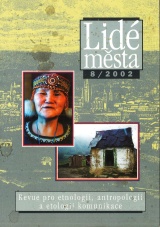Identita deklarovaná a žitá
Romští pedagogičtí asistenti - reflexe etnické kulturní a občanské identity
DOI:
https://doi.org/10.14712/12128112.4210Abstrakt
The authors asked the question of ethnic, cultural and national self-image of a newly created Romany cultural elite - educational workers in the position of Romany teaching instructors. Based on the data collected through an empirical ethnographical research (by the method of sample survey and half-standardised interviews) with 45 % of instructors who worked in the 2000-2001 academic year on Czech nursery, elementary and vocational schools in 19 towns of the Czech Republic, they arrived at the following conclusions: The Romanies who entered a new professional career of a teaching instructor make up a group whose attitudes and cultural background are diverse, but still anchored in the cultural roots of the Romany nation. The survey examines and defines a distinctive approach of the instructors to their nation, civic identity, and ethnic background, while it simultaneously formulates conclusions about the differences between 'otherness' which is really experienced and declared (in relation to the majority population) by them. The attitude to nation 1. The instructors' attitude to their nation, they identify themselves with, oscillates from a clear-cut self-realization to absolute vagueness and hesitation. 2. The preference of Czech nation has proved to be the basic declared attitude. In connection with the instructors' professional position as representatives of Romanies in the school this indicates a certain direction of the orientation of their views. But this does not always mean identification with the Czech nation without reservations. 3. The will to identify oneself with the Romany nation remained a position of a minority. Nevertheless, compared to the preliminary results of the population census taken in 2001 it proved to be quite sizable. One can understand this as a typical feature of a rising Romany ethnic self-realization of this group. 4. In terms of quality, there is a new position B self-realization in a double national identity, which has equally linked the Czech and Romany ethnic feelings. 5. Same instructors do not distinguish between the notions of national group and state citizenship. They identify the Czech nation with Czech citizenship. In such an attitude they are at the same time both Romanies and Czechs (the citizens of the Czech Republic). The attitude to civic identity 1. An overwhelming majority of Romany instructors absolutely identified themselves with the citizenship of the Czech Republic. 2. The Czech Republic's citizenship was most strikingly stressed by those instructors who claimed the Czech and Slovak nation. The attitude to the ethnic background 1. The attitude to one's own Romany roots has revealed a strongly rising trend of self-esteem. Despite this, some instructors have not overcome the uncertainty of their social acknowledgement. 2. lf one identifies himself as a Czech, which means that he/she declares himself as part of the Czech nation, the perception of social acknowledgment of Romanies is strongly undermined. By contrast, if the Czech nation is consciously rejected, one's own self-esteem is strengthened. The experienced and declared otherness 1. The feeling of belonging to the Romany nation has remained the overriding attitude and perception of Romany instructors. For them, the awareness of Romany otherness is taken for granted and ubiquitous. 2. The declared and experienced otherness of the instructors are moving apart. The experienced otherness is undergoing a process of innovation. This brings about a loosening of the binding character of former traditional links and cultural habits. On the other band, this also creates new cultural models. The arising and adopted models reflect the day-to-day life of Czech towns. One can consider them as a by-product of closing the gap behind the majority society, but this does not involve any loss of singularity. 3. Some individuals have started to raise some peculiarities of Romany cultural traditions and relationships to the position of symbols of the Romany distinctiveness, which means to the symbols of Romany ethnic identity.
Stahování
Publikováno
Jak citovat
Číslo
Sekce
Licence

Tato práce je licencována pod Mezinárodní licencí Creative Commons Attribution-NonCommercial-NoDerivatives 4.0.


